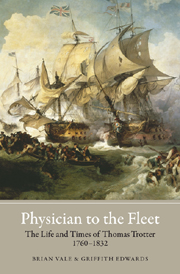Book contents
- Frontmatter
- Contents
- List of Illustrations
- List of Abbreviations
- Foreword
- Preface
- Background
- From Surgeon's Mate to Physician to the Fleet
- 3 HMS Berwick
- 4 Surgeon of a Slaver
- 5 Northumbrian Interlude
- 6 Recalled to the Colours
- 7 The Royal Hospital, Haslar
- 8 Physician to the Channel Fleet
- 9 The Conquest of Scurvy
- 10 Shore-Based in Plymouth
- 11 Honours and Half-Pay
- The Newcastle Years
- Bibliography
- Index
6 - Recalled to the Colours
from From Surgeon's Mate to Physician to the Fleet
Published online by Cambridge University Press: 12 September 2012
- Frontmatter
- Contents
- List of Illustrations
- List of Abbreviations
- Foreword
- Preface
- Background
- From Surgeon's Mate to Physician to the Fleet
- 3 HMS Berwick
- 4 Surgeon of a Slaver
- 5 Northumbrian Interlude
- 6 Recalled to the Colours
- 7 The Royal Hospital, Haslar
- 8 Physician to the Channel Fleet
- 9 The Conquest of Scurvy
- 10 Shore-Based in Plymouth
- 11 Honours and Half-Pay
- The Newcastle Years
- Bibliography
- Index
Summary
THE AMERICAN WAR had been an unparalleled disaster. With Britain outnumbered on land and sea by French, Spanish and Dutch forces, the American colonies had secured their independence, and attacks on British possessions in Gibraltar and India had only just been beaten off. A new government led by William Pitt took office in 1784, and applied itself to restoring Britain's power and prestige. Thin, sickly and austere, with no passions except for port wine, Pitt had nevertheless inherited his father's oratorical skills and ability to manage Parliament. Under his leadership the country's recovery was rapid. Government expenditure was slashed and the country's financial credit restored. The decline in transatlantic trade proved less than had been feared, but nevertheless stimulated a search for other markets in the East and the exploration of the Pacific, the Antipodes and the north-west coast of America by such men as James Cook, Matthew Flinders and George Vancouver.
The Royal Navy to which Thomas Trotter was dedicated and which he had now managed to rejoin had emerged from the American War in good state. The last-minute victory by Sir George Rodney over the French at the Battle of the Saints in April 1782 had restored morale, and his breaking of the enemy's line of battle, whether done accidentally or deliberately, had shown the solution to the tactical problem that had perplexed admirals throughout the eighteenth century. Since the time of Samuel Pepys, warships had been required to fight in long parallel lines.
- Type
- Chapter
- Information
- Physician to the FleetThe Life and Times of Thomas Trotter, 1760–1832, pp. 78 - 85Publisher: Boydell & BrewerPrint publication year: 2011



